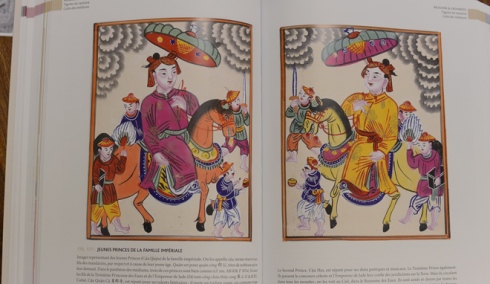A French institution has conducted extensive research on contemporary Vietnamese culture alongside its academic studies since it resumed operations in Vietnam over 20 years ago.
>> Vietnam at beginning of 20th century through French academy’s photos
École française d'Extrême-Orient (French School of the Far East), or EFEO, which is dedicated to the study of Asian societies, was founded in 1900 with its headquarters based in Saigon.
The institute relocated to Hanoi in 1902 before ending its operation in Vietnam in 1957.
The institute’s main fields of research are archeology, philology and the study of modern Asian societies.
During its early days, EFEO placed an emphasis on developing new science disciplines, which were in their infancy in the Southeast Asian country back then.
The French academy reopened in Hanoi in 1993, which marked a new phase in cooperation between Vietnam and France in social sciences and the humanities.
It has since carried out comprehensive research on Vietnamese contemporary culture, including recent works on the southern region and the Mekong Delta.
The research provides a solid foundation for such critically acclaimed works as “L’Univers des truyen Nom” (The Universe of Tales in Nom Language), and the “Assortment of Han-Nom Manuscripts.”
“Han” is the ancient Chinese script while “Nom” is the Chinese-transcribed Vietnamese hieroglyph.
According to Pascal Bourdeaux, head of the EFEO branch in Ho Chi Minh City since 2012, “Tong Tap Thac Ban Van Khac Han Nom Viet Nam” (roughly translated as 'Assortment of Vietnam’s Han-Nom Manuscripts'), authored by Prof. Philippe Papin with the assistance of his colleagues at Vietnam’s Han Nom Institute, is the first significant piece pf research on the Southeast Asian country’s historical origin.
Prof. Papin is a lecturer at the Paris Practice Graduate School and a former member of the EFEO and a discerning enthusiast and authority on Vietnamese art.
The professor and Olivier Tessier – EFEO’s representative – also led a collective research project which gave rise to a publication on villages in the Red River Delta in northern Vietnam. The study also involved Nelly Krowolski, of France’s Centre Asie du Sud-Est (Center of Southeast Asia, or CASE), as well as leading Vietnamese researchers including Prof. Phan Huy Le, chair of the Vietnam Association of Historical Science, Phan Dai Doan and Dang Nghiem Van. The research has shed new light on the northern rural area.
Meanwhile, EFEO’s research works on the stress of climate change on southern Vietnam, which is an innovative research trend, as Bourdeaux observed.
The works also focus on the people’s rustic lifestyle, religion and agricultural production practices.
“Such research opens a new window into the history, and helps spur the region’s future development,” Bourdeaux said.
EFEO is poised to release several noted books on the region’s rich culture and history this year.
One of them is a book which features a manuscript of the illustrations for a noted poem-story titled “Luc Van Tien,” which was composed by revered author Nguyen Dinh Chieu (1822-1888).
Another book to be published by EFEO this year will delve into the personality of the protagonists in “Luc Van Tien” and the impact of Confucianism on how they behave as well as the herbal medicine details, which the author mentioned in his tale.
“I’m really honored to help forge the cultural cooperation between Vietnam and France, which has hugely benefited France and hopefully Vietnam as well. I really appreciate my Vietnamese friends and colleagues’ assistance. Thanks to them, I have discovered more about Vietnamese people during my stay in the country,” said Prof. Léon Vandermersch, EFEO’s last member to leave Hanoi in 1958.
He also served as EFEO’s director from 1989 to 1993 and returned to Hanoi in early December last year.
Like us on Facebook or follow us on Twitter to get the latest news about Vietnam!



















































